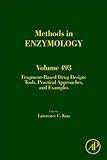Fragment-based drug design : tools, practical approaches, and examples /
Collection : Methods in enzymology ; . v. 493 Mention d'édition :1st ed. Détails physiques : 1 online resource (li, 591 pages, [16] pages of plates) : illustrations (some color) ISBN :9780123812759 (electronic bk.); 0123812755 (electronic bk.); 9780123812742 (electronic bk.); 0123812747 (electronic bk.).Includes bibliographical references and indexes.
Designing a diverse high-quality library for crystallography-based FBDD screening -- Preparation of protein samples for NMR structure, function, and small-molecule screening studies -- Key factors for successful generation of protein-fragment structures requirement on protein, crystals, and technology -- Predicting the success of fragment screening by X-ray crystallography -- Fragment screening of stabilized G-protein-coupled receptors using biophysical methods -- Using computational techniques in fragment-based drug discovery -- How to avoid rediscovering the known -- From experimental design to validated hits a comprehensive walk-through of fragment lead identification using surface plasmon resonance -- Practical aspects of NMR-based fragment screening -- Binding site identification and structure determination of protein-ligand complexes by NMR a semiautomated approach -- Protein thermal shifts to identify low molecular weight fragments -- HTS reporter displacement assay for fragment screening and fragment evolution toward leads with optimized binding kinetics, binding selectivity, and thermodynamic signature -- Fragment screening purely with protein crystallography -- Computational approach to de novo discovery of fragment binding for novel protein states -- Lead generation and examples opinion regarding how to follow up hits -- Medicinal chemistry inspired fragment-based drug discovery -- Effective progression of nuclear magnetic resonance-detected fragment hits -- Advancing fragment binders to lead-like compounds using ligand and protein-based NMR spectroscopy -- Electron density guided fragment-based drug design--a lead generation example -- Experiences in fragment-based lead discovery -- Fragment screening of infectious disease targets in a structural genomics environment.
Description based on print version record.
There are numerous excellent reviews on Fragment Based Drug Discovery (FBDD), but there are to date no hand-holding guides or protocols with which one can embark on this orthogonal approach to complement traditional high throughput screening methodologies. This Methods in Enzymology volume offers the tools, practical approaches, and hit-to-lead examples on how to conduct FBDD screens. The chapters in this volume cover methods that have proven to be successful in generating leads from fragments, including chapters on how to apply computational techniques, nuclear magnetic resonance, surface plasma resonance, thermal shift and binding assays, protein crystallography, and medicinal chemistry in FBDD. Also elaborated by experienced researchers in FBDD are sample preparations of fragments, proteins, and GPCR as well as examples of how to generate leads from hits. Offers the tools, practical approaches, and hit-to-lead examples on how to conduct FBDD screens. The chapters in this volume cover methods that have proven to be successful in generating leads from fragments, including chapters on how to apply computational techniques, nuclear magnetic resonance, surface plasma resonance, thermal shift and binding assays, protein crystallography, and medicinal chemistry in FBDD.


Il n'y a pas de commentaire pour ce document.